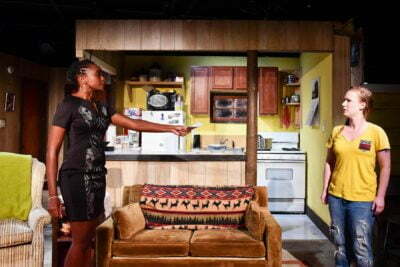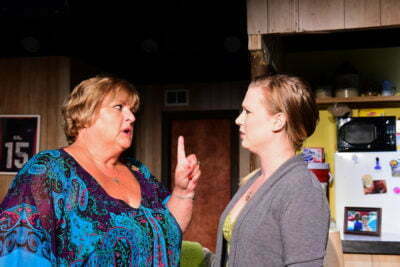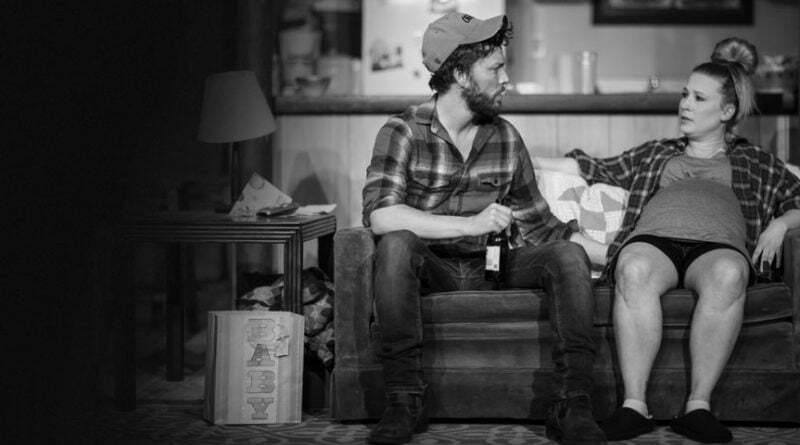Byhalia, Mississippi (remount)

By Evan Linder
Directed by Tyrone Phillips
Produced by The New Colony & Definition Theatre Company
Playing at Steppenwolf’s 1700 Theatre, Chicago
Byhalia, Mississippi Returns!
Reprising their wildly popular, twice-extended, Jeff Award-winning co-production from the spring, The New Colony and Definition Theatre Company remount Evan Linder’s nation-wide conversation-starter Byhalia, Mississippi at The Steppenwolf, giving those who neglected to learn its difficult life lessons another chance at redemption. Covering themes such as racism, hypocrisy, forgiveness, and love with humor and drama, I can see why the play garnered such popular appeal from both critics and theatre-goers alike, especially because of the decidedly progressive perspective it take on its subject matter (which, of course, is virtually a moot point).
Acknowledging that mine will be a minority opinion, I, nevertheless, was underwhelmed by the production. Though it’s not to my taste, Byhalia, Mississippi’s entertainment-factor is undeniable: drama-cum-comedy in sit-com beats rolling over a story so tailor-crafted to the nouveau social tastes and mores of the majority audience of theatre-goers that its straight-jacket, assumptive logic is so sharp and tight one would be embarrassed to take it off to scrutinize it.
 Yet I demur: Linder’s portrayal of in-bred, southern, racial prejudice offers no new insight into either the characters or their culture, but merely nurses and hand-spoons the same progressive, social values currently en vogue: whatever conversation this play may start, its popular conclusions are already drawn from within the play itself. To put it in another, analogous way: Can a conversation between a Christian and an atheist be one of conclusions, or merely of evangelization?
Yet I demur: Linder’s portrayal of in-bred, southern, racial prejudice offers no new insight into either the characters or their culture, but merely nurses and hand-spoons the same progressive, social values currently en vogue: whatever conversation this play may start, its popular conclusions are already drawn from within the play itself. To put it in another, analogous way: Can a conversation between a Christian and an atheist be one of conclusions, or merely of evangelization?
Enter the South: Byhalia, Mississippi. In a small, two-bedroom apartment we meet the very pregnant Laurel (Liz Sharpe) and her mother Celeste (Cecelia Wingate). Celeste, in her eagerness to be a grandma, has been staying with her daughter and son-in-law almost two weeks in doting anticipation for her grandbaby’s arrival. Though she’s appreciative and coolly tender to her mother, Laurel’s patience has worn, and, by the time her husband, Jim (Evan Linder), returns home, Celeste is packed and ready to leave (amicably) — much to the satisfaction of Jim, who has as lukewarm of feelings for his mother-in-law as she has for him (Laurel married under her potential, thinks Celeste).

Unfortunately (or fortunately, as the case may be), Celeste isn’t there to welcome her grandbaby into the world. Unfortunately (for certain), Jim is, and his reaction is less than understanding: his newborn child is black (he, we note, is not). Karl (Jeffery Owen Freelon Jr.), Jim’s friend, is home to congratulate the couple when they arrive from the hospital, but Jim arrives alone and his incredulous rage soon ignites against Karl with an accusation that he, Karl, is the adulterer — based solely on the coincidence that both the baby and he are black. After a brief but violent fight, Jim cools off and Karl invites him to stay at his place: Jim may still helplessly love Laurel, but he’d be damned if he’s going to stay married to her!
After Jim and Laurel separate, Jim stalks the baby’s real father and Celeste practically disowns her daughter: neither are willing to forgive this embarrassment — a hypocritical turn since Jim himself has cheated on Laurel in the past and Celeste is apparently a Christian. While Jim’s life gradually unspools to alienate everyone around him, Laurel begins to find the confidence to face up to the inherent racism of her southern culture, exemplified by her mother’s horrific suggestion to “get rid of” the baby. After Laurel decides to stay in Byhalia to raise her interracial child, it’s up to Jim to decide whether he wants to be the husband and father he always wanted to be with Laurel.

As I stated above, Byhalia, Mississippi entertains very well: its movement between the humorous and the dramatic will, I think, appeal to many. Although, I found this movement to be too reminiscent of a sit-com, which kept me from engaging emotionally with the characters’ stories — except the fabulous Cecilia Wingate, whose comedic delivery seemed most natural to her character (Celeste), and whom I found the most interesting and sympathetic because of her honest performance.
Surprisingly, the set (an impressive design by John Wilson) also kept me at an emotional distance from the play’s action, in large part due to the lighting (by Slick Jorgensen), which, though perhaps aimed at photorealism, repelled me in its similarity to (again) a sit-com. With the comedic dialogue and technical aspects of the production against me, I failed to find much truth in the acting as a whole, though there are some very nice moments that come through, particularly in Jeffrey Owen Wilson Jr.’s performance as Karl.

Nevertheless, Linder clearly is trying to communicate something to us he sees as important both nationally and in terms of the South. I struggle, though, to penetrate deeper than the obvious hypocrisy and racism of Celeste and Jim. Though she acts out of concern for her daughter, Celeste’s attitude and actions are clearly racist, though she denies it (as one does, we think to ourselves). Jim’s hypocrisy and racism, on the other hand, is, I think, meant to be “worse” on account of how oblivious he is to it and therefore how insidiously poisonous it is to his relationships. For instance, Jim denies that his infidelity and Laurel’s are the same: his, he says, bore no consequence; hers, however, bore a child. And there are other such shocking moments of chauvinistic insensitivity, such as when the play’s action briefly pauses for Laurel to explain to him why men can’t call women “bitches.” (Later he will go on to call Laurel a bitch.)

Jim’s racism, however, is even more slippery to prove, and perhaps this is where Linder’s conversation starts, though I’m dubious as to whether it’s open-ended or merely another lesson to be learned for the insensitive. Ayesha (Kiki Layne), the black wife of Laurel’s adulterous partner, factors in a lot in the second act, and at one point she calls Karl out on trying to be an “Uncle Karl” — heavy emphasis on “Uncle.” This apparently opens Karl’s eyes to how he’s been treated by Jim: despite his unflinching support of Jim and Laurel (he built the baby’s crib, let Jim stay at his place, and helped Jim pack), the only thanks Karl seems to have earned is being accused of adultery based on his race.

The disillusioned Karl quickly ends his friendship with Jim, claiming that he’s never felt more like a “nigger” than when Jim accused him of sleeping with his wife. I found this to be an untenable accusation (akin to Jim’s own brand of selfishness), and rather unbelievable and pathetic, given that these two have been life-long friends and Jim’s outburst was made in a fit of hysteria. But perhaps this itself is what Linder expects us to converse on — if only he doesn’t mean for us to take this as the undeniable truth of the banality of racism.
That being said, regardless of this critic’s opinion, the popularity of Linder’s Byhalia, Mississippi must speak to the popularity of its appeal: multitudes nationwide have seen it and at least many critics have enjoyed it. That’s something to talk about. Linder certainly knows how to write an entertaining story for his audience.
Somewhat Recommended
August Lysy
25 July 2016
For more information, see Byhalia, Mississippi’s page on Theatre in Chicago.
Playing at Steppenwolf’s 1700 Theatre, 1700 N. Halsted St., Chicago. Tickets are $30 – $35. For tickets and information, call the Steppenwolf box office at 312-335-1650, or visit Steppenwolf.org. Performances are Thursdays and Fridays at 8 p.m., Saturdays at 2:30 p.m. and 8 p.m., and Sundays at 2:30 p.m. thru August 21st. (Note: bring a coat if you are one who tends to get cold: the theatre is small and the A/C vents blow on you.) Running time is 1 hour and 45 minutes, with one, 15-minute intermission.

